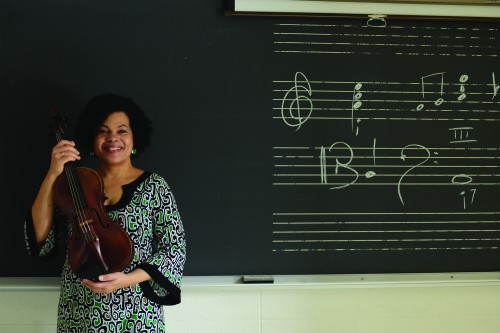By Brandon Mennenoh
The viola is probably the least known of the string instruments. But during a recent faculty concert, the viola was the star of the show. Visiting professor of music Diane Phoenix-Neal, accompanied on the piano by assistant professor of music Paul Kovacovic, put on a recital entitled “Elegies,” sorrowful songs or poems usually performed for the dead.
“Rather than thinking of these elegies and poetic dances as all melancholic or sad in nature,” Neal said in her introduction, “I would like to offer our elegies as musical reflective poetry.”
Phoenix-Neal and Kovacovic performed six pieces from the 19th and 20th centuries and from a variety of composers. Each had a different poetic story that reflected the time period and the life of the composer. Phoenix-Neal talked about each piece before performing it, which helped set the mood for the audience and put the pieces in context.
There was never a dull moment for the audience during the recital. Each piece had an air of mystery about it. There were moments of power followed by moments of calm. The contrasting dynamic levels and tempo changes helped bring the music and emotion to life. The pieces chosen for the program showed off the range of the two instruments. The lyric percussiveness of the piano and the warm sound of the viola made a great combination, and the two instruments complemented each other well.

Her teenage years were spent at the high school division of the University of North Carolina School of the Arts. “I liked it so much that I decided to stay there for my undergraduate studies.” After receiving her bachelor’s, she went on to study at The Juilliard School of Music.
While working towards her doctoral degree at the University of North Carolina-Greensboro, she began teaching college students. Phoenix-Neal has also done adjunct teaching at North Carolina Agricultural and Technical State University, Fayetteville State, Bennett College and Gilford College.
Before earning her doctorate, Phoenix-Neal was invited to play with an orchestra in Europe, where she stayed for 10 years. She was also a semi-finalist in an international string quartet competition in Banff in the province of Alberta, Canada, and she has won concerto competitions with the North Carolina Symphony Orchestra and chamber music competitions at UNC-Greensboro. During her year at Central, she is directing the College Community Orchestra and teaching courses in advanced music theory, world music and string methods, as well as private violin methods.
The evening of viola music ended with a piece entitled “Vocalise,” which was written by Russian composer Sergei Rachmaninoff and originally intended for the voice. In this case, it was transcribed for the viola. Before performing it, Phoenix-Neal shared that she likes to imitate the human voice when she plays. The music filled the room, and it felt as if the viola were singing.
“Music is a universal language,” says Phoenix-Neal. “Through music you can express emotions that you may not be able to express in words.”

